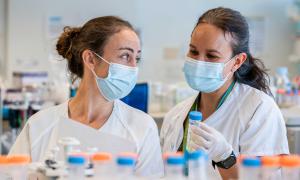What is needed to develop a therapeutic HIV vaccine?

HTI vaccine: a major scientific and economic challenge
The scientific community has been working for years to develop a therapeutic HIV vaccine that stimulates the immune system to control the virus without the need for treatment, i.e. to achieve a functional cure. In addition to immense scientific background work, it takes time and financial support to build up projects of this scale.
"The design of a therapeutic vaccine against HIV is an exceptionally complex scientific challenge," says Beatriz Mothe, researcher at IrsiCaixa and doctor at Germans Trias Hospital. The complexity Mothe refers to is due to the fact that this virus has a very high mutation rate and that, in addition, it attacks the immune system itself, making it difficult for the defensive response against HIV to be sufficient to control it. However, in 2011, the IrsiCaixa AIDS Research Institute, as part of the HIVACAT consortium, developed an anti-HIV immunogen, that is, a vaccine candidate - called HTI - capable of generating a powerful immune response against the virus in laboratory experiments.
Once one of the most important hurdles has been overcome, which is to make the scientific discovery and gather evidence of its potential as a vaccine, it is necessary to obtain financial support to be able to produce the drug and take it to clinical trials, which are extremely long and costly steps. In order to move the project forward, AELIX Therapeutics was founded and both public and private funding sources were sought. "Philanthropy is one of the key sources at this early stage as it acts as seed money, the first money that comes in and allows you to start growing the project," says Christian Brander, ICREA researcher at IrsiCaixa and scientific director of AELIX Therapeutics. In this sense, the help of the Glòria Soler Foundation was essential. "For us it is essential that entities, people and companies believe in our research and, with their solidarity, act as promoters of change," he adds.
The case of AELIX Therapeutics is a success story. Ten years after the discovery of the molecule, the spin-off has succeeded in getting the vaccine tested in humans, conducting a phase I/IIa clinical trial evaluating the administration of 8 doses of 3 HTI vaccines. The results of the first trial, published in the journal Nature Medicine, have shown that the vaccine is safe and provides partial control of the virus in 40% of participants who have received the vaccine once they are temporarily taken off antiretroviral therapy. 97% of those given the vaccine have at least doubled the specific immune response against the vulnerable parts of viruses included in HTI vaccines. Of these, the people who have had the strongest response against these parts of the virus are those who have been able to better control HIV and have been off treatment the longest, confirming the direct relationship between vaccine response and viral control. The results are promising and justify further development of HTI vaccines to try to increase the number of people with HIV who respond and improve viral control as effectively as current antiretroviral treatment does. To this end, two clinical trials are currently underway testing different combinations of HTI vaccines with other products.